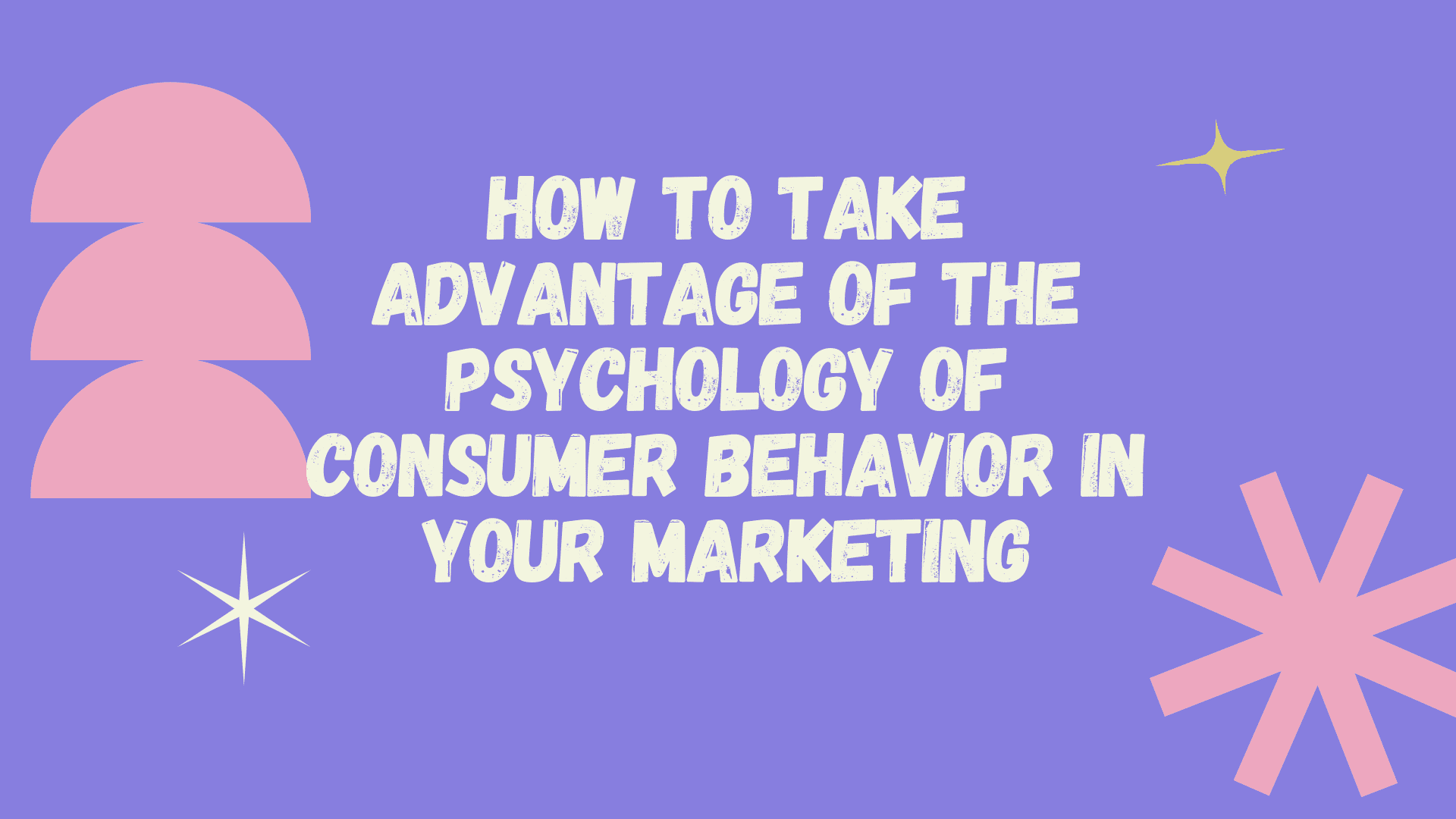Marketing is most effective when it establishes an emotional connection with consumers, not solely relying on logic. As humans, we make decisions based on emotions and psychology, even if we don’t realize it. Smart marketers use strategies based on consumer behavior patterns and psychology.
This helps create marketing that resonates at a deeper level. Here’s an in-depth look at key ways to take advantage of consumer psychology for more effective marketing.
Contents
Getting to Know Your Customers

Mass marketing techniques target large groups in a broad, general way. But not everyone thinks and feels the same. Segmenting audiences into smaller groups with common behaviors and interests allows for more customized marketing. Detailed buyer personas describe your ideal customers in each segment.
Looking beyond basic demographics provides deeper insights. Psychographic profiles categorize people based on their attitudes, values, and lifestyles. For example, a music app could divide users into “Urban Techie Teens” or “Small Town Families” based on location and age. Gaining a deeper understanding of their listening habits, the causes they are passionate about, their communication preferences, and their perceptions of your brand enables highly customized marketing.
In the landscape of remote and hybrid work, effective virtual teamwork relies on cutting-edge collaboration tools. Facilitating seamless communication, coordination, and productivity across dispersed teams, these tools are indispensable. Leveraging qualitative insights gleaned from these technologies enhances content creation and campaign optimization, ensuring personalized and engaging marketing. The ability to continually refine audience segments through robust analysis of customer data adds an extra layer of customization, resulting in laser-focused marketing tailored to specific consumer mindsets.
For startup companies navigating the complex realms of market research, brand strategy, creative design, digital marketing campaigns, social media management, and content creation, establishing a robust brand presence can be formidable. However, specialized digital marketing agencies play a pivotal role in simplifying this journey for startups. With their expertise and focus on digital marketing for startups, these agencies provide invaluable support, making the challenging task of building a strong brand presence more accessible and achievable for emerging businesses.
Marketing That Pulls at the Heartstrings
Features and benefits alone rarely drive sales. Emotion often determines what consumers buy. Marketing that evokes emotions leaves a more profound impact than presenting dry facts. Compelling storytelling allows brands to connect emotionally, not just logically.
Start by identifying the desired emotions you want people to feel about your brand. Notice what feelings currently shape your brand image. Understand your audience’s emotional landscape surrounding your brand. This helps craft messaging that meets them where they are and strengthens ties through shared understanding.
Humor enhances likeability and cements positive associations. Viral social media videos frequently use funny, amusing content to capture attention and spark joy. Witty banter on social platforms can also authentically endear your brand.
Eliciting emotional responses through inspirational stories and tapping into universal human emotions like love, pride, and hope also resonates deeply. Real customer stories capture emotional moments authentically. This pathos connects on a deeper human level to impress your brand in consumer memory and build loyalty.
Pricing Strategies Based on Psychology
Pricing is about more than numbers. Behavioral economics reveals how psychology shapes perceived value. Smart pricing uses these consumer bias blindspots.
The anchoring effect shows that exposing shoppers to a higher initial price makes a later lower price much more enticing. The initially inflated price serves as an anchor, shaping perception. Floating a premium offering first makes target options seem like a comparative bargain, focusing people on the discount over objective amounts.
Similarly, presenting pricing in smaller increments frames value advantageously. A $25 weekly subscription seems more affordable than a $1300 annual cost, despite being equal. Reframing the period alters buyer psychology regarding affordability.
Scarcity principles also trigger a sense of urgency. Limited-time countdowns, low inventory warnings, and exclusive access promotions leverage the fear of missing out. Consumers hate lost opportunities so scarcity nudges them to buy quickly.
Building a Brand Personality
Effective branding strategically nurtures long-term consumer relationships. Done right, a brand sticks in people’s hearts and minds, earning loyalty beyond surface-level associations. This comes from consistently positive interactions that build affinity and trust over time.
Similar to personal relationships, consumers connect with brands that exhibit human personality traits. Is your brand friendly? Witty? Down-to-earth? Consumers are drawn to brands embodying characteristics they identify with.
Brands also convey aspirational ideals that shape consumer identity. Aligning your brand with desirable lifestyles strengthens emotional bonds, as customers perceive your brand as embodying how they want to be perceived.
Taking a multidimensional approach to brand identity beyond logos builds richer engagement and loyalty. Infusing personality establishes brands as relationship partners rather than interchangeable commodities.
Bringing Consumer Psychology to Life
Understanding consumer psychology provides direction to resonate with audiences and drive sales. Tailored outreach through segmentation optimizes relevance. Emotional storytelling forges strong bonds. Pricing strategies leverage buyer psychology. Building an engaging brand personality cultivates loyalty beyond surface impressions.
Combining psychology-informed strategies with data analysis enables ongoing optimization of marketing. This integrated approach effectively captures both minds and hearts, leading to increased sales. Here are tips for executing psychological marketing concepts:
- Audit current marketing across channels. Identify weak spots to integrate psychological principles. Prioritize high-impact areas like social, websites, and ads.
- Set specific metrics to track how enhancements affect engagement, conversions, and sentiment. Monitor performance and conduct surveys to quantify impact.
- A/B tests new psychological messaging against old approaches. For example, test a scarcity-focused email against a neutral product email. See which spurs more sales.
- This split testing provides data on what resonates with each audience. Evolve campaigns based on empirical data of tactics working in real life.
- Start small by infusing one concept at a time, then build on successes. Enrich buyer personas with psychographic data. Introducing an emotional video campaign. Adjust pricing strategies. Consistency and persistence pay off.
The Future of Marketing Psychology
Consumer psychology will only grow more crucial as technology evolves. Data-driven personalization and automation enable more psychologically-targeted communication than ever.
For example, customizing messaging based on AI-detected personalities. Or adjusting prices based on context signals like location and purchase history.
Advances in neuroscience and behavior research will uncover new psychological insights to further optimize marketing. Eye tracking, emotion measurement, and implicit testing reveal subconscious reactions.
In the future, marketing psychology will become standard, not specialized. Deep human knowledge combined with smart tech will allow brands to connect with individuals in unprecedented ways.
Even as channels and trends evolve, human psychology remains unchanged. Marketers dedicated to truly understanding their customers have exciting possibilities. Leading with empathy and psychology deepens engagement and loyalty over time. The future of marketing is psychological.
FAQs
Some core principles include emotional decision-making, mental shortcuts and biases, the power of storytelling and aspiration, personality associations, and the influence of psychological pricing cues. Understanding these facets of consumer psychology allows marketers to craft more impactful campaigns.
Segmentation divides consumers into groups with common behaviors and attributes. This enables more customized messaging tailored to the unique psychology of each segment. Marketing feels more personalized and relevant, driving stronger engagement.
Techniques like emotive storytelling, highlighting inspirational customer stories, using humor, and portraying universal human experiences allow brands to forge deeper heart-level connections. Marketing that elicits emotion leaves a more powerful imprint.
Tactics like anchoring to a higher initial price, breaking costs into smaller increments, and scarcity messaging leverage mental shortcuts, biases, and emotional responses to optimize perceived value.
Consumers form relationships with brands that embody personality traits they identify with. Brands also enable consumers to convey aspirational qualities about their own identities. Brand personality strengthens emotional bonds beyond surface impressions to drive lasting loyalty.
Also Read:
- How to Change Twitch Name Color in Chats & More Tips
- Effective Ways To Improve Your SEO With Heatmaps
- Java Print vs Println – What’s The Difference?
- How to Use Discord in Full-Screen Mode(Web & Application)
- Printf vs cout: What is the difference?
